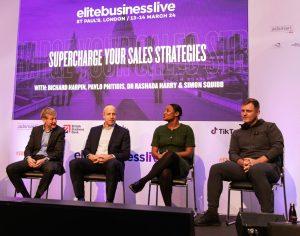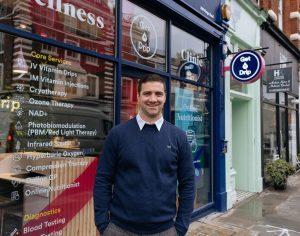Women deal with many issues. From facing sexism during their entrepreneurial journeys to day-to-day living, their lives are undoubtedly fraught with challenges. And many of them – like the taboo surrounding women’s period and menstruation products – have been left unaddressed in the past, meaning products improving the lives of women have been left uninvented. Fortunately, many female founders are launching startups aimed at covering this gap. One of them is Thang Vo-Ta is set to change that by launching Callaly, the femcare company aiming to “put women’s health first without compromise.”
Vo-Ta, who was also a property developer, is responsible for the product called the Tampliner which is essentially “a new cross between a tampon and pantyliner.” The idea was, however, inspired and invented by gynaecologist Alex Hooi, who met Vo-Ta when he rented one of his properties. “Through his practice he’d listened to thousands of women express their frustrations with traditional period products which were often leaky and uncomfortable,” Vo-Ta says.
While Vo-Ta is now passionate about helping society – especially women – and wants to “revolutionise the femcare industry by creating new, meaningfully innovative products that people with periods love,” it wasn’t his plan to spearhead a business. Looking back, he was into investment banking and private equity. It was when Hooi told him of the idea of a tampliner that it piqued his interest. “Alex shared with me the earliest prototypes of the now tampliner – I was fascinated at its potential and the very positive feedback from family and friends who were willing to try a hand-stitched samples,” he recalls.
A new product must be tried, tested and perfected and the founders ensured to take constant feedback to continually improve the product. “Prototypes in the thousands were painstakingly made and tested, with significant feedback received and acted upon before arriving at our final design,” remembers Vo-Ta. The duo then enlisted the help of Ewa Radziwon, a garment technologist who assisted in improving the product on the comfort and design fronts. Additionally, Vo-Ta took more than a decade to only secure patents around the world.
And, even after perfecting the product, getting the business off the ground was no less than a herculean task. “[We] had to build our operations from the ground up, including R&D, supply chains, packaging and logistics,” he recalls. “We’ve even had to design and develop bespoke automated machinery. This has meant learning a lot as we go along and hiring the right people to bring more expert knowledge into the company and help us keep the highest standards possible.”
Furthermore, gaining credibility from the industry was hardly easy. “Building credibility is one of the toughest challenges any startup faces,” Vo-Ta says. “We’ve had to work really hard, and grovel when needed, to convince suppliers to waive minimum order quantities so we can test, develop and choose the best processes and materials possible.”
Apart from the operational challenges, it wasn’t easy for Vo-Ta to get funding. Given that most VC firms struggle with equality and that there are more male investors than women, it’s often harder to persuade them to inject money in a product aimed for women. “Every startup has to convince investors, suppliers and researchers to trust them but yes, being in a taboo industry certainly makes this even more difficult,” Vo-Ta says. “Half of our current investors didn’t say yes the first time around; there was simply not that much interest in a sector that has been as cloaked in secrecy and avoidance as femcare has. We’ve seen it all along the way – scepticism, disinterest, embarrassment – and we’ve often found ourselves explaining the basics of periods and the female anatomy to male investors, which has sometimes been eye opening.” And that’s why Vo-Ta pumped his own savings in the beginning and over time built a group of angel investors to support the company. He even received a £1m grant from Innovate UK which helped him to upgrade the company’s technology.

Ewa Radziwon and Thang Vo-Ta
However, these challenges didn’t deter this entrepreneur to keep innovating and launching new period products for women. “It really is a fantastic time to be in the femtech industry [and] people are only now really waking up to a completely underserved and very important market that has suffered from a dire lack of innovation,” Vo-Ta argues noting that the whole industry was being neglected. “It’s not just the products themselves but a longstanding lack of imagination in terms of how products have been grouped, packaged and delivered.”
While it was an uphill trek to break into a new market, it also meant Vo-Ta could delve deeper into the untapped market and capitalise on the opportunities available. “For example, for many years women have had to buy single-absorbency packs in bulk from retail shops and we know this is inconvenient and wasteful yet until now few companies have come up with creative solutions,” he says. And that’s what drove him into launching a concept where a customisable box would be delivered through the door every month to suit the customer’s cycle. “There are many such examples of lazy thinking when it comes to women’s needs and, although that is rather depressing in its way, it’s also exciting because there’s so much opportunity,” he adds.
Additionally, although his business is aimed to support women, Vo-Ta believes in “doing good is good business, not just good for business.” Hence he’s involved in many philanthropic initiatives to help more women across the globe including donating more than 6% of the revenue to women’s charities as well as ensuring 3% of his and his employees’ time goes towards volunteering for causes. He has also been responsible for supporting Days for Girls, an international charity that provides reusable period products to girls living in poverty as well as charities like Bloody Good Period, The Red Box Project, Street Cramps, Solace, Women’s Aid and Southall Black Sisters. “Few things are as satisfying as getting unsolicited feedback from our customers thanking us for inventing a product that deals with lifelong issues of leakage and discomfort,” Vo-Ta says. “On top of that, ensuring that every purchase of our products benefits society and the environment in some small way helps bring purpose to everything we do.”
The passion Vo-Ta has for female healthcare goes beyond his products. In fact, it’s evident in this company culture. He believes head honchos must prioritise their wellbeing should they want to be successful. For instance, he actively encourages flexible working amongst his staff. “As long as work is done to the high standards we require for our customers, every team member is able to arrange their hours and place of work to suit their health,” he says. “Obviously this approach wouldn’t work in every job in every business but we believe workers should always be encouraged to look after their health without fear of guilt or financial penalty. And that – of course – includes their menstrual health.” He also encourages his staff to be open about any physical and mental health issues as well as taking regular smear tests.
Looking forward, Vo-Ta is bullish about his future endeavours in the sector as he’ll be launching many more products in the femcare sector. The product range will expand to include tampons, pads and liners alongside tampliners. And, he also has plans to start exporting his products to Europe after conducting product testing in France, Germany and Sweden. His long-term plans include treading into the US in 2020 and eventually Asia and China.
Indeed, while female founders have launched startups targeting other women’s needs in areas like sextech and femtech, not many male entrepreneurs have dared to venture in the industry. And, looking at Vo-Ta’s ambition to disrupt the femcare market, we’re sure Callaly is only to grow further. “Build a company with purpose, where people can thrive and not just profits,” he advises. “Help other entrepreneurs who are fighting the same fight you are.”
Share via:


















































